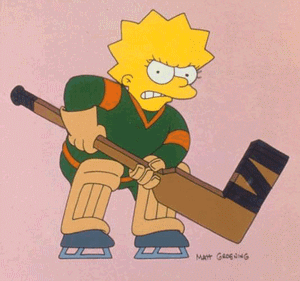
Herschel Shmoikel Pinchas Yerucham Krustofsky, better known by his stage name Krusty the Clown, is a recurring character on the animated television series The Simpsons. He is voiced by Dan Castellaneta. He is the long-time clown host of Bart and Lisa's favorite TV show, a combination of kiddie variety television hijinks and cartoons including The Itchy & Scratchy Show. Krusty is often portrayed as a cynical, burnt-out, addiction-riddled smoker who is made miserable by show business but continues on anyway. He has become one of the most frequently occurring characters outside the main Simpson family and has been the focus of many episodes, some of which also feature Sideshow Bob.
Apu Nahasapeemapetilon is a recurring character in the American animated television series The Simpsons. He is an Indian immigrant proprietor who runs the Kwik-E-Mart, a popular convenience store in Springfield, and is known for his catchphrase, "Thank you, come again". He was voiced by Hank Azaria and first appeared in the episode "The Telltale Head". He was named in honor of the title character of The Apu Trilogy by Satyajit Ray.

Springfield is the primary fictional setting of the American animated sitcom The Simpsons and related media. It is an average-sized, fictional city within an unknown state in the United States. The fictional city's geography, surroundings, and layout are flexible, often changing to accommodate the plot of any given episode.

The Kwik-E-Mart is a convenience store in the animated television series The Simpsons. It is a parody of American convenience stores, such as 7-Eleven and Cumberland Farms, and depicts many of the stereotypes about them.
"The Telltale Head" is the eighth episode of the American animated television series The Simpsons. It originally aired on the Fox network in the United States on February 25, 1990. It was written by Al Jean, Mike Reiss, Sam Simon and Matt Groening, and directed by Rich Moore. In the episode, Bart cuts the head off the statue of Jebediah Springfield in the center of town to impress Jimbo, Kearney and Dolph, three older kids he admires. The town's residents, including the three boys, are horrified and Bart regrets his actions. After telling Lisa and Marge, Homer and Bart head to the center of town, where they are met by an angry mob. After Bart tells the mob that he has made a mistake, the townspeople forgive Bart and the boy places the head back on the statue. The episode's title is a reference to the 1843 short story "The Tell-Tale Heart" by Edgar Allan Poe.

"Treehouse of Horror IV" is the fifth episode of the fifth season of the American animated television series The Simpsons and the fourth episode in the Treehouse of Horror series of Halloween specials. It originally aired on the Fox network in the United States on October 28, 1993, and features three short stories called "The Devil and Homer Simpson", "Terror at 5+1⁄2 Feet", and "Bart Simpson's Dracula".

"Lisa on Ice" is the eighth episode of the sixth season of the American animated television series The Simpsons. It was the first broadcast on the Fox network in the United States on November 13, 1994. In the episode, Lisa discovers that she possesses a skill for ice hockey. A rivalry between her and Bart ensues.

"Homer's Barbershop Quartet" is the first episode of the fifth season of the American animated television series The Simpsons. It originally aired on the Fox network in the United States on September 30, 1993. It features the Be Sharps, a barbershop quartet founded by Homer Simpson. The band's story roughly parallels that of the Beatles. George Harrison and David Crosby guest star as themselves, and the Dapper Dans partly provide the singing voices of the Be Sharps.

"Lisa the Vegetarian" is the fifth episode of the seventh season of the American animated television series The Simpsons. It originally aired on the Fox network in the United States on October 15, 1995. In the episode, Lisa decides to stop eating meat after bonding with a lamb at a petting zoo. Her schoolmates and family members ridicule her for her beliefs, but with the help of Apu as well as Paul and Linda McCartney, she commits to vegetarianism.
"I'm with Cupid" is the fourteenth episode of the tenth season of the American animated television series The Simpsons. It first aired on the Fox network in the United States on Valentine's Day, 1999. The episode takes place on Valentine's Day, and the wives of Springfield are jealous of the attention Apu gives to his wife Manjula. Angered by this, Moe and the Springfield husbands spy on Apu to sabotage his romantic plans.

"22 Short Films About Springfield" is the twenty-first episode of the seventh season of the American animated television series The Simpsons. It originally aired on the Fox Network in the United States on April 14, 1996. It was written by Richard Appel, David X. Cohen, Jonathan Collier, Jennifer Crittenden, Greg Daniels, Brent Forrester, Dan Greaney, Rachel Pulido, Steve Tompkins, Josh Weinstein, Bill Oakley, and Matt Groening, with the writing being supervised by Daniels. The episode was directed by Jim Reardon. Phil Hartman guest-starred as Lionel Hutz and the hospital board chairman.
"All Singing, All Dancing" is the eleventh episode of the ninth season of the American animated television series The Simpsons. It originally aired on the Fox network in the United States on January 4, 1998. In the fourth Simpsons clip show, Homer claims he hates singing, so Marge shows family videos of musical numbers from previous seasons. The episode is in the form of a sung-through musical, featuring spoken dialogue only at the start and end of the episode. The original material was directed by Mark Ervin and written by Steve O'Donnell. It was executive produced by David Mirkin. It features guest appearances from George Harrison, Patrick Stewart and Phil Hartman, although these are all clips and none of them recorded original material for the episode.

"Homie the Clown" is the fifteenth episode of the sixth season of the American animated television series The Simpsons. It originally aired on the Fox network in the United States on February 12, 1995. In the episode, Homer becomes a Krusty the Clown impersonator, but is mistaken for the real Krusty by the Springfield Mafia. Joe Mantegna returned as Fat Tony, while Dick Cavett and Johnny Unitas guest starred as themselves.
"The Sweetest Apu" is the nineteenth episode of the thirteenth season of the American animated television series The Simpsons. It originally aired on the Fox network in the United States on May 5, 2002. In the episode, Homer and Marge discover that convenience store owner Apu is having an affair with the Squishee delivery lady working in his store.
"Much Apu About Nothing" is the twenty-third episode of the seventh season of the American animated television series The Simpsons. It originally aired on the Fox network in the United States on May 5, 1996. In the episode, a referendum is placed on the ballot that will require all illegal immigrants in Springfield to be deported. After learning that Apu will be deported if the measure passes, Homer helps him prepare for a United States citizenship test so that he can become a legal citizen.
"Lisa's Pony" is the eighth episode of the third season of the American animated television series The Simpsons. It originally aired on the Fox Network in the United States on November 7, 1991. In this episode, Homer goes drinking at Moe's Tavern instead of buying a new reed for Lisa's saxophone, making her flop at the school talent show. Desperate to win back his daughter's love, Homer gives Lisa the one thing she has always wanted: a pony. Homer struggles with two jobs to cover the cost of sheltering and feeding it. After seeing the sacrifices he endures to pay for it, Lisa decides to part with her pony.
"Team Homer" is the twelfth episode of the seventh season of the American animated television series The Simpsons. It originally aired on the Fox network in the United States on January 7, 1996. In the episode, Homer starts a bowling team with Moe, Apu, and Otto. When Mr. Burns discovers the team was funded with his money, he insists on joining, but the team fears he will cost them the league championship. In the subplot, Bart's "Down with homework" T-shirt incites a school riot, so Principal Skinner implements a uniform dress code.

The fifth season of the American animated television series The Simpsons originally aired on the Fox network between September 30, 1993, and May 19, 1994. The showrunner for the fifth production season was David Mirkin who executive produced 20 episodes. Al Jean and Mike Reiss executive produced the remaining two, which were both hold overs that were produced for the previous season. The season contains some of the series' most acclaimed and popular episodes, including "Cape Feare", "Lisa vs. Malibu Stacy", "Homer Goes to College", "Deep Space Homer", and "Rosebud". It also includes the 100th episode, "Sweet Seymour Skinner's Baadasssss Song". The season was nominated for two Primetime Emmy Awards and won an Annie Award for Best Animated Television Program as well as an Environmental Media Award and a Genesis Award. The DVD box set was released in Region 1 on December 21, 2004, Region 2 on March 21, 2005, and Region 4 on March 23, 2005.
"Exit Through the Kwik-E-Mart" is the fifteenth episode of the twenty-third season of the American animated television series The Simpsons, and the 501st episode overall. It originally aired on the Fox network in the United States on March 4, 2012. In the episode, Bart is punished by Homer after letting a rabbit loose in the house. He gets revenge on his father by spray-painting images of him with the word "dope" all over Springfield. Street artist Shepard Fairey encounters Bart one night and offers him a gallery show of Bart's artworks. However, Chief Wiggum suddenly appears during the show and arrests Bart for covering the town in graffiti. It turns out that Fairey is an undercover officer working for Wiggum.
"Much Apu About Something" is the twelfth episode of the twenty-seventh season of the American animated television series The Simpsons, and the 586th episode of the series overall. The episode was directed by Bob Anderson and written by Michael Price. It aired in the United States on Fox on January 17, 2016.










